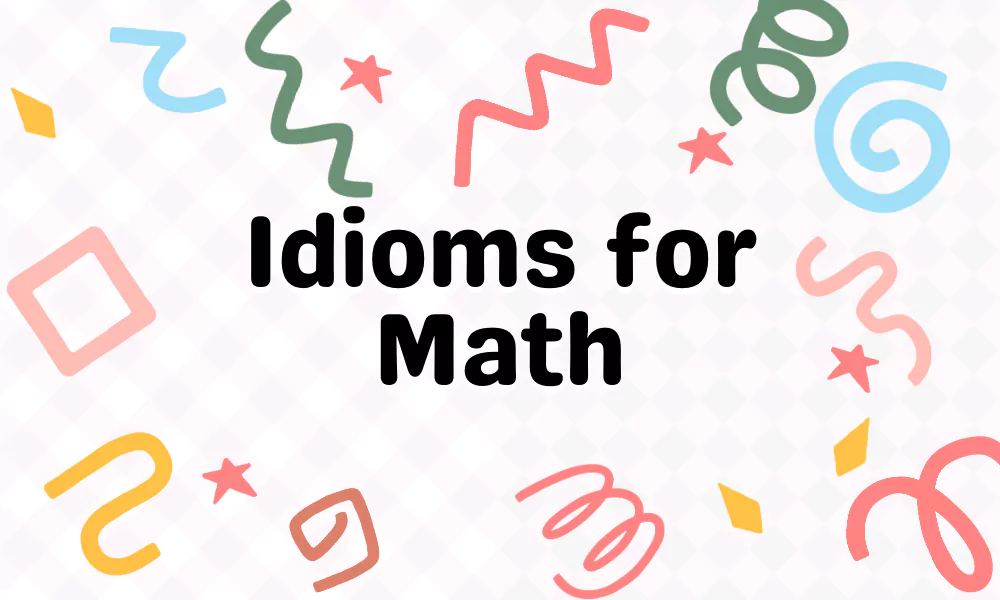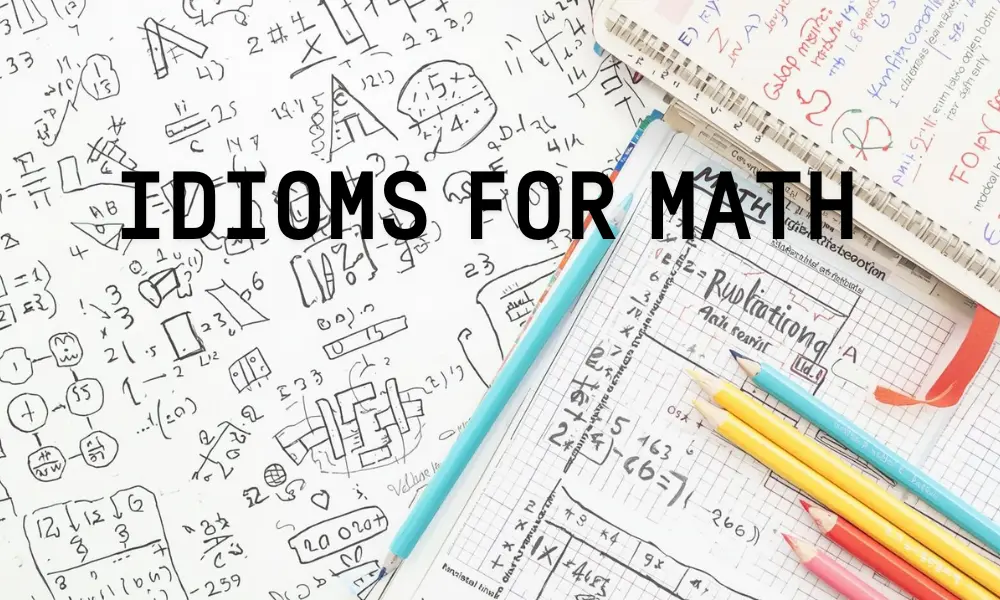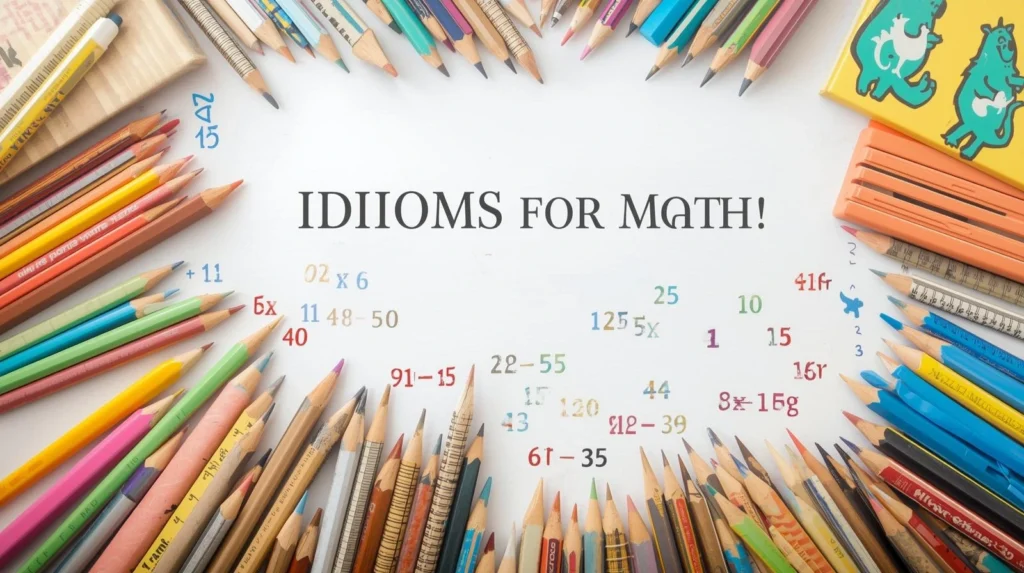Idioms for Math – Classic Mathematical Sayings with Meanings and Examples

Math isn’t just about numbers, equations, or complex formulas but it’s also a world full of creativity, imagination, and expression. Just like English uses idioms to make ideas more vivid and memorable, math too has its own collection of idiomatic expressions that bring concepts to life. Think of phrases like “crunch the numbers” or “don’t count your chickens before they hatch”, they remind us that math isn’t confined to the classroom but woven into everyday life. These math-related idioms not only make problem-solving more fun but also help students and teachers connect language with logic in a natural way.
What Are Idioms for Math?
Idioms for math are everyday expressions that use mathematical terms or ideas to describe situations in life, often beyond numbers and equations. They make language more vivid, relatable, and easy to remember. For example, when someone says “crunch the numbers,” it doesn’t mean literally chewing numbers but it means carefully analyzing data. Similarly, “adding it all up” can mean drawing a conclusion. These idioms show how math influences the way we think, communicate, and solve problems in creative ways.

Commonly Used Idioms for Math
- Crunch the numbers – To analyze or calculate.
Example: The accountant stayed late to crunch the numbers before the report. - By the numbers – To do something methodically.
Example: The teacher explained the lesson by the numbers so no one got confused. - Not adding up – Something that doesn’t make sense.
Example: His excuse just isn’t adding up. - Add fuel to the fire – To worsen a situation.
Example: Yelling back will only add fuel to the fire. - Safety in numbers – Being in a group provides protection.
Example: The kids walked home together, believing there’s safety in numbers. - Zero tolerance – Strict rule with no exceptions.
Example: The school has a zero tolerance policy for bullying. - Calculated risk – A risk that’s been thought through.
Example: Starting a new business is always a calculated risk. - Divide and conquer – Breaking down a task to make it easier.
Example: Let’s divide and conquer this group project. - Subtract from – To lessen the value of something.
Example: The rude comment really subtracted from her achievement. - Know the score – To understand the situation clearly.
Example: Don’t argue with the boss; you know the score. - On the same page – To agree or understand similarly.
Example: Let’s meet tomorrow to get on the same page about the project. - Add insult to injury – To make a bad situation worse.
Example: Being late was bad enough, but forgetting the gift added insult to injury. - A numbers game – A situation where success depends on quantity.
Example: Sales is often a numbers game. - The whole nine yards – Doing everything possible.
Example: She went the whole nine yards for her birthday party. - Calculated move – A carefully planned action.
Example: Accepting the offer was a calculated move on his part. - More than one can count – Too many to track.
Example: She has won more awards than one can count. - In two minds – To be undecided.
Example: I’m in two minds about switching jobs. - Added bonus – An extra benefit.
Example: The free dessert was an added bonus. - Negative growth – Decline or loss.
Example: The company faced negative growth last year. - Back to square one – To start over.
Example: The plan failed, so it’s back to square one. - Second to none – The best.
Example: Her math skills are second to none. - Even odds – Equal chances.
Example: There are even odds that he’ll win the match. - Two sides of the same coin – Two different aspects of the same thing.
Example: Freedom and responsibility are two sides of the same coin. - Count your blessings – Be grateful.
Example: Instead of complaining, count your blessings. - Count sheep – To try to sleep.
Example: He lay awake counting sheep all night. - Lose count – Unable to keep track.
Example: I’ve lost count of how many times I’ve seen that movie. - The lowest common denominator – Simplest or least sophisticated level.
Example: The TV show appeals to the lowest common denominator. - Strength in numbers – Group power.
Example: Protesters relied on strength in numbers. - On cloud nine – Extremely happy.
Example: She’s been on cloud nine since her promotion. - To sum up – To summarize.
Example: To sum up, the meeting was a success. - Added up to something – To result in something.
Example: All her efforts added up to a major win. - Square deal – A fair agreement.
Example: The contractor offered a square deal. - At sixes and sevens – In confusion.
Example: The office was at sixes and sevens after the sudden news. - Give or take – Approximately.
Example: The trip will take three hours, give or take. - It all adds up – It makes sense.
Example: Her story finally adds up. - Go figure – Expression of surprise.
Example: He failed the test despite studying all night, go figure. - Square off – Prepare to fight or compete.
Example: The two teams squared off before the match. - Squaring the circle – Trying to do the impossible.
Example: Negotiating peace sometimes feels like squaring the circle. - Third time’s a charm – Success after two failures.
Example: I’ll try again, the third time’s a charm. - Two plus two equals four – Something obvious.
Example: It’s simple; two plus two equals four. - Take into account – To consider.
Example: Take into account her hard work before judging. - Put two and two together – To figure something out.
Example: He put two and two together and realized she was lying. - Count me in – To include oneself.
Example: If you’re going hiking, count me in! - Count me out – To exclude oneself.
Example: If it’s karaoke night, count me out. - Lose the plot – To lose focus.
Example: Halfway through, he lost the plot of the story. - In no uncertain terms – Clearly and firmly.
Example: The teacher warned them in no uncertain terms. - Right on the money – Exactly correct.
Example: His prediction was right on the money. - More than meets the eye – More complex than it seems.
Example: This puzzle has more than meets the eye. - The sum total – The overall result.
Example: The sum total of her efforts was success. - The bottom line – The most important fact.
Example: The bottom line is we need more time.
Rare and Unique Idioms for Math
- Square the ledger – To settle accounts fairly.
Example: He squared the ledger before leaving the company. - Multiply like rabbits – To grow or increase rapidly.
Example: The rumors multiplied like rabbits. - Balancing the equation – Making things fair or equal.
Example: The new law is about balancing the equation of justice. - Negative equity – Having more debt than value.
Example: The house went into negative equity after the crash. - Prime example – A perfect model.
Example: She’s a prime example of determination. - Divide loyalties – To split commitment between two sides.
Example: His decision divided loyalties among friends. - Cross-multiplying problems – Complicating matters.
Example: Instead of solving, you’re just cross-multiplying problems. - Fraction of the cost – Much cheaper.
Example: I bought the phone for a fraction of the cost. - Mean value – The average or middle ground.
Example: His ideas were the mean value of the group’s opinions. - The rule of three – Things work best in threes.
Example: Good speeches often follow the rule of three.
Read: Idioms For Cake
Math Idioms in Literature and Pop Culture
- “The sum of its parts” – Whole is greater than the pieces (Aristotle, often quoted in literature).
Example: The novel is more than the sum of its parts. - “The square root of nothing” – Worthless (used in satire/comedy).
Example: His excuse was the square root of nothing. - “Two plus two make five” – Illogical truth (George Orwell, 1984).
Example: Blind obedience can make two plus two equal five. - “A zero-sum game” – One’s gain is another’s loss.
Example: Politics is often treated like a zero-sum game. - “Beyond calculation” – Too vast to measure (classic literature).
Example: Her kindness was beyond calculation. - “Adding insult to injury” – Making it worse (Shakespeare-inspired).
Example: He mocked him, adding insult to injury. - “Power of ten” – Signifying greatness (popular science & media).
Example: His influence grew to the power of ten. - “Exponential growth” – Rapid rise (business, science, pop culture).
Example: Streaming services saw exponential growth in the 2020s. - “An equation with no solution” – An impossible problem (poetry/metaphor).
Example: Their love was an equation with no solution. - “Calculate the odds” – To predict chances (common in films/games).
Example: The hero calculated the odds before risking everything.

Synonyms and Alternatives for Math
| Synonym | Meaning |
|---|---|
| Arithmetic | Basic operations like addition, subtraction, multiplication, and division. |
| Calculations | The process of working out answers with numbers. |
| Equations | Mathematical statements showing equality. |
| Figures | Numbers used in data or representation. |
| Formulas | Standard mathematical expressions or rules. |
| Geometry | A branch of mathematics dealing with shapes, space, and dimensions. |
| Algebra | Math that uses symbols and letters to represent values. |
| Statistics | The study of data, probability, and trends. |
| Computation | The act of calculating using methods or computers. |
| Mathematics | The formal and complete word for math or maths, covering all its branches. |
Tips for Using Math Idioms in Writing and Speech
- Use Math Idioms to Simplify Complex Ideas
Replace technical jargon with idioms like “crunch the numbers” or “back to square one” to make explanations more engaging. - Blend Humor and Relatability
In casual speech, idioms like “do the math” or “it doesn’t add up” make conversations lively and easy to follow. - Create Strong Imagery
Idioms such as “divide and conquer” or “balancing the equation” help readers visualize abstract ideas more clearly. - Adjust Idiom Choice to Audience
Use common idioms (like “count your blessings”) with general audiences, but choose unique ones (like “squaring the circle”) for advanced writing or literature. - Mix Idioms with Storytelling
When writing essays, speeches, or blogs, weave idioms naturally into narratives instead of listing them, this makes the content memorable and authentic.
Read: Idioms For Job
Read: Idioms For Unique
FAQs
Conclusion
Math is more than just formulas, equations, and calculations, it’s also a language filled with creativity and expression. Math idioms connect numbers with everyday experiences, making communication more colorful, relatable, and memorable. From commonly used phrases like “crunch the numbers” to unique expressions like “squaring the circle,” these idioms show how mathematics influences the way we think, speak, and even tell stories. Whether you’re a student learning math, a teacher making lessons engaging, or a writer looking to add flair to your language, math idioms can bridge the gap between logic and imagination.
